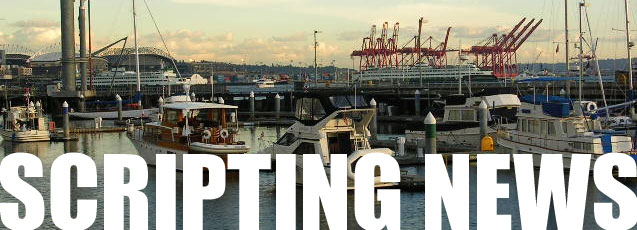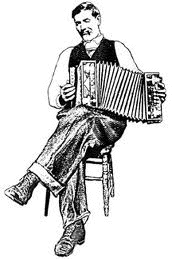
 Chipping away at "hard" -- for the poets
Chipping away at "hard" -- for the poets I make software for poets, and myself.
That means my stuff stretches the boundaries of what's possible, which makes it a mystery for many of the people I would like to have use it.
My goal has been to chip away at the mystery. One step at a time. That's why a few years ago I started working on EC2 for Poets, a tutorial that proposed to show non-geeks how to set up their own server in the cloud at Amazon. There have been three versions of the tutorial. And in the interim Amazon has dropped the price for the server that you set up to $0 for one year. So with it being so easy, and free for a year -- there shouldn't be any reason that anyone who knows about it isn't running a server.
The problem is that it isn't all so easy. Yet.
Last week I helped a friend Anton Zuiker, a really smart and stubbornly persistent person, get his EC2 for Poets server up and running. He had set it up, but when I went in to look, I found a half-dozen small problems that were keeping his server from running.
While I was doing the work, I got depressed. I realized that we had set Anton out on the open sea in a very small boat, with a leak, and no paddle and only a couple of gallons of gas in the engine. I realized that we had done him wrong.
Then I realized there was a missing tutorial.
You can only see these things, I find, when you look at your own work through the eyes of a user that's trying really hard, but not getting it.
So I opened up my outliner and started writing.
This is what came out: S3 for Poets.
I take S3 for granted, I think it's easy, and for programmers it is easy. But we forget sometimes that what seems simple to us might not be so simple to a literate person who isn't a programmer. For example, a poet. Like Anton.
 Here's what the problem was. We got Anton's server up and running, but it wasn't connected properly to its storage.
Here's what the problem was. We got Anton's server up and running, but it wasn't connected properly to its storage.
A storage system is like an external drive from Seagate, for example. It hooks up to your server, on EC2 (or where ever). And it also hooks up to the Internet. That's what's really cool about S3. But the connection between the two things, as explained in the Why It Works section, is something not everyone gets. So I work up to the punchline. Slowly, methodically and carefully. If you stick with it, for maybe 1/2 hour, you will understand the Internet one thousand times more fully than you did before. This is the Aha that programmers got a long time ago. Now you can have it too, even if you're not a programmer.
Everyone wants to become a coder these days. My friendly and avuncular advice is to start here. First get an Amazon account, then connect it up to your GoDaddy account (I know I hate them too, but everyone uses them), then put a file up there, then view it in your web browser. Connecting these dots gives you a view into the crazy simplicity of the Internet. It's all mirrors pointed just the right way so it looks like the Internet. That is all the Internet is. When you fully appreciate this you'll laugh at how funny this stuff is. Really. I'm not kidding.
I'm thinking about Jay Rosen and Doc Searls, and the students that learn from them. Joi Ito, Ethan Zuckerman, Zach Tumin, Nicco Mele, Susan Crawford, David Weinberger, John Palfrey and his high school students, Tim O'Reilly, Larry Lessig, Esther Dyson, Clay Shirky, danah boyd, Markos Moulitsas, Cory Doctorow, Revi Sterling, Mark Bernstein, Andrew Grumet, Craig Newmark, Josh Marshall, Bill Gates, Charlie Nesson, Marc Canter, Chris Anderson, John Perry Barlow, Michael Arrington, Douglas Rushkoff, Emily Bell, Jeff Jarvis, Steve Wozniak, Matt Terenzio, Edd Dumbill, Matt Mullenweg, Philip Greenspun, Paul Ford, Arikia Millikan, Anil Dash, Zeldman, Kottke, Megnut, Evhead, David Jacobs (both of them), Rex Hammock, Fred Wilson, Bijan Sabet, Mitch Kapor, Mitchell Baker, Noah Robischon, Robert Scoble, Micah Sifry.
All these people can do this, and even better, they can show others how to, as well. I think that enabling people to put their own stuff in the cloud, especially young people just beginning their careers, can help give us all some ideas about freedom, and what we might do with it. Every one of the people I listed above is fully capable of doing this. How many actually have had the experience of putting something on the net that's entirely in their control? Created something new that didn't exist before?
I know it's possible to find flaws this setup. And I point them out in S3 for Poets. But we need to move forward on both fronts. Using the flawed tools we have today, and at the same time building tools without the flaws. S3 is pretty good. Not perfect. But it's something we can use today, for good.
 Tabbed rivers: One small step for news
Tabbed rivers: One small step for news Over the weekend I put together a new kind of river -- a tabbed river -- that gets closer to what a news publication will look like in the future.
Rivers are a reverse-chronologic view of news from multiple sources. Twitter is a river, although rivers predate Twitter. Rivers actually predate the Internet. A teletype is a river of news.
The tabbed river is more or less what it sounds like. An array of tabs across the top of the page, one for each river.
I've started my tabbed river out with five streams: The Olympics, TechMeme, my own personal river, New Orleans and Berkman. Each had previously been on its own page. I would have to remember to go to each. And when I pointed to one, no one got to find out that the others exist. So now my news-gathering routine is both broader and more efficient. I get to keep up with several streams as easily as it used to be to keep up with one.
Hope you like it!
 What has podcasting accomplished?
What has podcasting accomplished? I started podcasting in the summer of 2003. I had been listening to two early podcasters, although they weren't called that at the time -- much as early blogging wasn't called blogging. The name came later. My two inspirations were Doug Kaye and Steve Gillmor.
Doug did a series of interviews with tech people called IT Conversations, and Steve did what he called The Gillmor Gang, which was and still is a roundtable discussion about nothing, much the same way Seinfeld was a TV series about nothing.
 It's almost ten years later, and while podcasting is huge, according to the BBC more people listen to podcasts than use Twitter, the press is still not sold on the accomplishments of the medium. The latest takedown is by Richard MacManus at ReadWriteWeb.
It's almost ten years later, and while podcasting is huge, according to the BBC more people listen to podcasts than use Twitter, the press is still not sold on the accomplishments of the medium. The latest takedown is by Richard MacManus at ReadWriteWeb.
Yes, podcasting is huge, he says, but look at how it's dominated by NPR. That means radio won, he says, the promise of podcasting which was an overturning of the hierarchy, was a losing proposition.
I don't know where that idea came from, that podcasting meant the end of radio. That's not at all what I wanted from it. What I wanted was to be able to go around the gatekeepers at public radio, but I loved NPR and PRI then, and still do today. I remember clearly, listening to a pledge drive on WBUR in Boston saying that we, the listeners, owned the station. I tried to call the station management, as one of the owners, to ask when I could get some airtime for my ideas. They offered to send me a glossy brochure on why WBUR is so great. They didn't get the idea. I never got to speak to the CEO who had gushed so enthusiastically on the radio about how important the listeners were.
There was also a low-grade competition going on at Berkman Center, where I was a research fellow at the time. Berkman was a sponsor of the Public Radio Exchange, or PRX, whose idea was to distribute public radio programming from the big stations to the little ones. Distribution was the key idea of PRX. The big stations only had 24 hours a day to broadcast, just like the smaller-market stations. Podcasting overturned that idea. With the Internet there is no concept of a 24-hour broadcast day. You can upload as many hours of MP3s as you like, and if there are people who care, you will get listened to. Eventually that battle was settled and today PRX is a thriving venture, distributing podcasts of course. ![]()
The battle of podcasting was to get access to the distribution channel for anyone who wanted it, and that certainly has been accomplished. We wanted, very much, for public radio to use this channel. When Tony Kahn at WGBH showed up on our mail list, we gave him a huge embrace, and offered whatever help we could. Public radio was a huge force for the adoption of podcasting, and I would argue is totally in-line with their goals. I would have been happy to explain this to the CEO of WBUR had she been willing to come to the phone back in 2003.
The problem with gatekeepers is that they want to keep those gates up. New technology comes along from time to time and takes down the gates. Podcasting was one such technology. We're now living in the post-revolutionary world. When we fall in love with a great TV show, for example, we expect to hear a podcast with the director, writers and stars, and you can tell that they love doing it. That's how this media works. Podcasting gave us a huge number more hours so that weird ideas could be tried out. It's made my life richer, because when I take auto trips I don't have to listen to crap. I get to hear exactly what I want, when I want.
To me it doesn't matter what's popular as long as it doesn't limit access to the people I want to hear from. Podcasting, like blogging accomplished that. I often ask people if they want to do a podcast with me to explore an idea. I haven't been doing that so much in the last year, for me it comes and goes. But the freedom to do it, that's what matters most.
So podcasting is about freedom, just like blogging. And I'd say that both have been raging successes, have exceeded all the expectations we set back in the beginning, wildly.